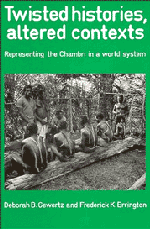Book contents
- Frontmatter
- Contents
- List of illustrations
- Acknowledgements
- Introduction: On writing the Chambri
- 1 The new traditionalism: tourism and its transformations
- 2 The initiation: making men in 1987
- 3 The town
- 4 Western representations at home
- 5 The written word
- 6 Negotiating with the state
- Conclusion: Interlocking stories, intersecting lives
- Appendix A: Godfried Kolly's life story
- Notes
- References
- Index
6 - Negotiating with the state
Published online by Cambridge University Press: 05 June 2012
- Frontmatter
- Contents
- List of illustrations
- Acknowledgements
- Introduction: On writing the Chambri
- 1 The new traditionalism: tourism and its transformations
- 2 The initiation: making men in 1987
- 3 The town
- 4 Western representations at home
- 5 The written word
- 6 Negotiating with the state
- Conclusion: Interlocking stories, intersecting lives
- Appendix A: Godfried Kolly's life story
- Notes
- References
- Index
Summary
Although Godfried was evidently the first to propose compiling a Chambri Bible, the manner in which he presented this project was entirely familiar to other Chambri. It was common – indeed expected – for Chambri men to present their particular political objectives and accomplishments as constituting “public service” (to quote Yarapat). Such statements did not, however, strike Chambri as in any way hypocritical, lamentable or other than inevitable.
Because the Chambri viewed all power as stemming from the same (clan-based) ancestral source, they regarded an individual's efforts to pursue his own interests, and his efforts to regulate society and nature, as comparable activities: all such (essentially male) activities were fundamentally political as all testified to a person's control of his ancestral power. This meant that the Chambri were unlikely to conceive of public service or public interest for its own sake. Under these circumstances in which all projects were understood as having important components of self-interest, a frequent objective of rhetoric was to convince other men that a given project would bring benefit to them sufficient to offset the prestige accruing to the successful sponsor. Thus, for example, Maliwan managed to convince most of the men of Wombun that enhanced artifact sales would justify their support of his men's house.
Chambri did not, though, see their society as simply the product of individuals engaged in the competitive pursuit of their own self-interest.
- Type
- Chapter
- Information
- Twisted Histories, Altered ContextsRepresenting the Chambri in the World System, pp. 169 - 195Publisher: Cambridge University PressPrint publication year: 1991



